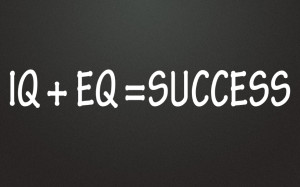 There was a great piece in the New York Times by Daniel Goleman that I still look to as an excellent reminder of what good leadership is and isn’t, and it definitely includes developed emotional intelligence. Although emotional intelligence, (or EQI as it is commonly referred to), has many components, Goleman talks about the top 4 competencies that good leaders exhibit.
There was a great piece in the New York Times by Daniel Goleman that I still look to as an excellent reminder of what good leadership is and isn’t, and it definitely includes developed emotional intelligence. Although emotional intelligence, (or EQI as it is commonly referred to), has many components, Goleman talks about the top 4 competencies that good leaders exhibit.
#1 Self-Awareness
Self-awareness is about understanding not only your own strengths and weaknesses, but your feelings as well. A good deal of leadership is about understanding what you are NOT good at and picking the best person to fulfill those duties or responsibilities. However, a lot of leaders have a hard time with this because their ego does not allow them to say they do anything poorly or at least not as good as someone else. The other piece that gets in the way is when leaders feel the need to hang on to everything and refuse to delegate, thus depriving others of success and keeping themselves stuck in a destructive cycle that can hurt them and the company. Doing it ALL is not good leadership. It might get things done but at a great cost both personally and professionally. Good leadership is about acknowledging one’s skills and feelings honestly and hiring others to do what is not your “best” strength.
#2 Self-Management
The next competency that emotionally intelligent leaders exhibit is self-management. This is defined as the ability to stay calm under pressure and not panic, or overshare your feelings and be a reassurance for people during a crisis, (as opposed to the leader who pours lighter fluid on an already raging fire). This is the ability to calmly discuss problems and find solutions, and dealing objectively with issues versus reading meaning into every action. Additionally, it’s the ability to self-motivate – to decide on the course and move ahead, regardless of setbacks. Good leaders do this naturally and people feel safe working for them. They don’t worry about what the boss’s mood might be today and feel pressured to adjust accordingly.
#3 Empathy
The third competency is empathy. This is a highly underrated competency and is often associated with being weak. However, it is much harder to try and understand someone’s perspective than to just adopt your own and move on. Empathy requires good listening skills and an ability to make others feel heard and valued. An empathetic leader will often be called a good communicator. In addition, as with good self-management skills, people will feel safer with a boss who is capable of empathy.
#4 Relationship Skills
The last competency is relationship skills. This is marked by the ability to be persuasive and communicate in ways that motivate people. People feel relaxed around you and often laugh. It’s very hard to get people to do things when they don’t like you and feel disrespected. It’s very easy when they like you and want to be involved. They feel respected and often laugh and have fun. Some leaders may be the best strategists in the world, but if they can’t or don’t motivate the team to follow, it’s just another strategy on paper.
As a leader, how is your development in each of these four competencies? If you need a little work, you’re not alone. In order to build these skills you may need to work with a coach and some assessment tools to develop your abilities, but it will be worth it.
